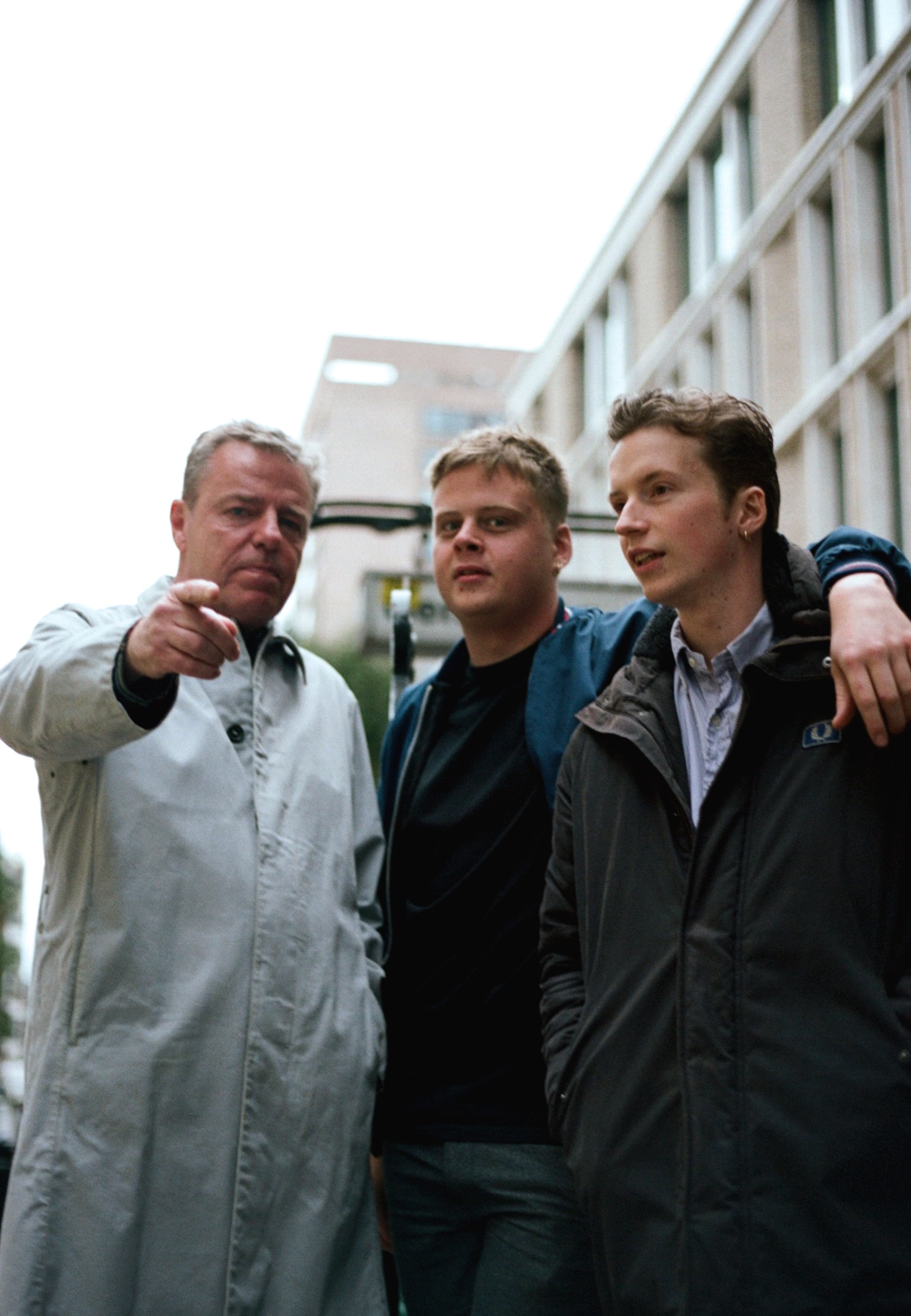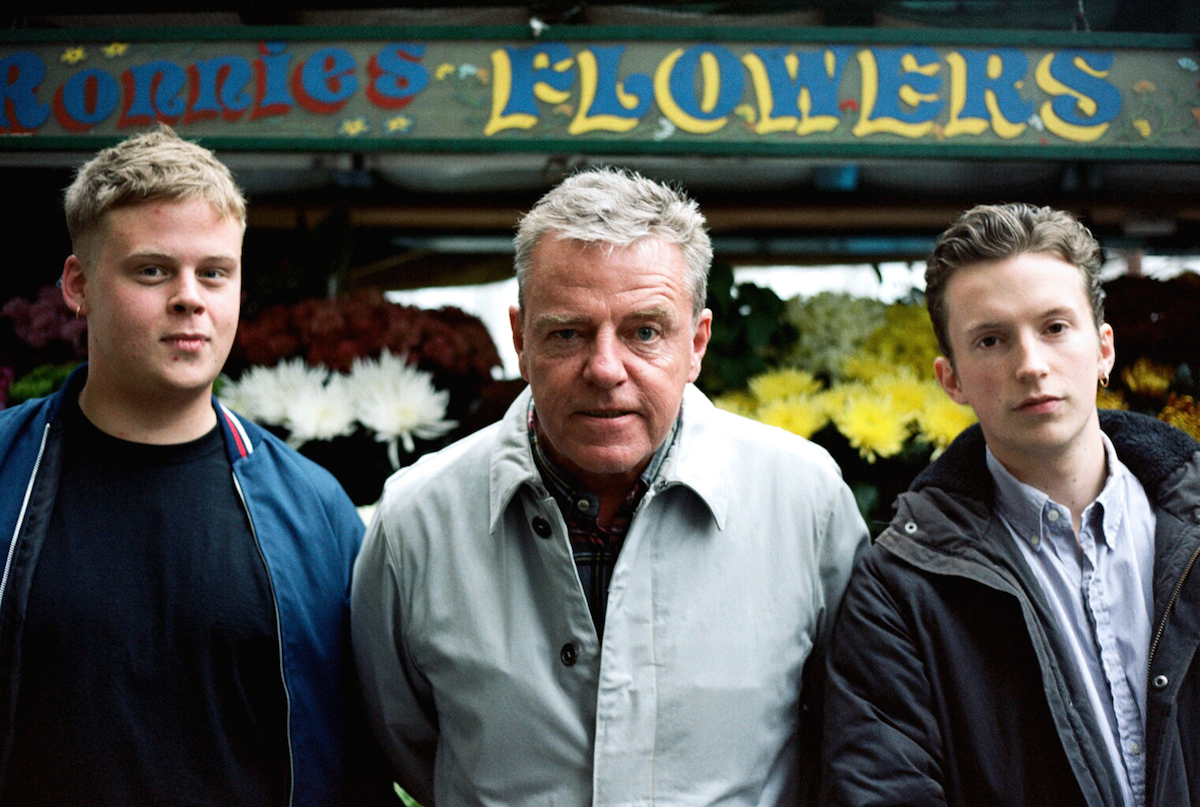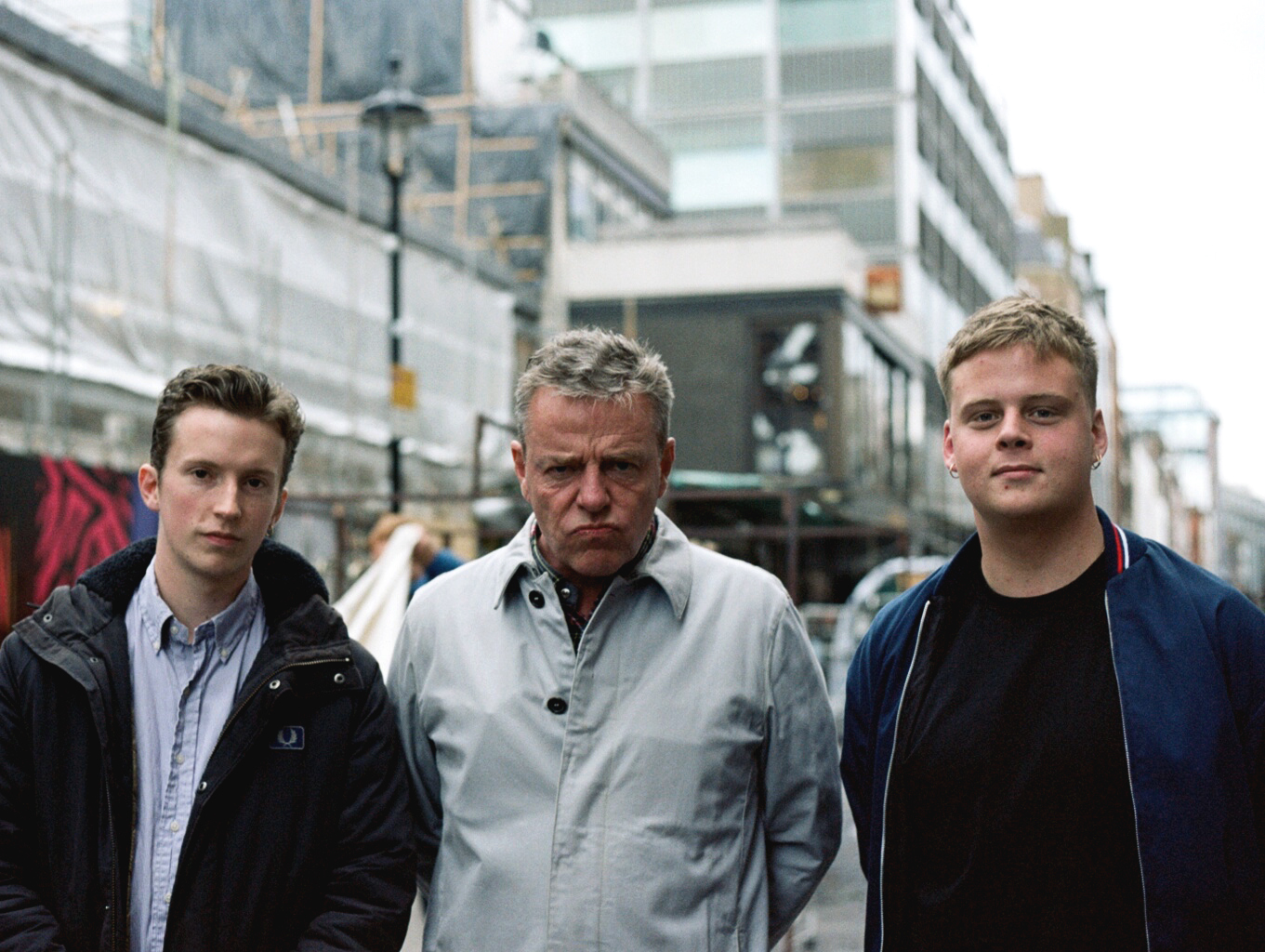Walking down Dean Street with Suggs is like being in the presence of the Lord Mayor of Soho. People rush to shake his hand; a milkman asks him to sign a petition for an under-threat marketplace; even Shane Richie, Alfie Moon himself, pops up at one point to say hello and pose for a photo.
For the last forty years, the man born Graham McPherson and his gang of Nutty Boys, Madness, have been sewn into the fabric of London; heavy heavy hits Our House, Baggy Trousers and It Must Be Love grasping all the humour and pathos of the city, soundtracking weddings, funerals, knees-ups and school discos from High Barnet to Tooting Bec.
A band similarly poised to soundtrack the next 40 years are fellow Londoners The Rhythm Method. With Rowan Martin providing the pair’s super-smart pop sensibility (he’s also writing for the very good Zoee) and Joey Bradbury the group’s happy/sad lyrical nous, they are next in a long line of London chroniclers that begin with music hall at the turn of the 20th century and continues today with the city’s resurgent grime scene.
With a new Madness album, Can’t Touch Us Now, out tomorrow and The Rhythm Method set to perform at Holloway’s Nambucca this evening, we thought what better time to get the two together for a chat, taking in David Bowie, Francis Bacon, Melvyn Bragg, Camden Town, Keith Vaz and the definition of the word “herbert” before we’d even turned on the dictaphone…

Joey: I was listening to [new Madness single] Mr Apples over the last few days and was really taken by it. I was wondering, when you write a song like that, after being around as long as you have, does it come almost as a relief that you can still do it? Or does it feel the same as when you were writing songs for the first time?
Suggs: Certainly that song came very naturally. You know, you’re always looking for new ways to present yourself. You’re never wanting to think we’re just going round in circles. But sometimes something pops out like that and you think, that is just an evocation of who we are and who we’ve always been. Popping holes in the balloons of pomposity! I was reading about Nile Rodgers recently and he was talking about HDM, hidden deeper meaning. And I’m sure a lot of the pop records I was listening to growing up, especially soul records, had that. And so did a lot of Madness records.
Joey: It feels like one of the reasons we’re inspired by you, and Madness in general, is that ability to talk about the deeper meanings and serious subjects with a sense of humour. Occasionally it goes against you because you can get disregarded as a joke band, can’t you?
Suggs: Very true. Very, very true. You know we’ve called this album Can’t Touch Us Now and it was that. We spent so many years with people saying we were in a joke. I remember in the 80s they’d be taking New Romantics seriously because they brought in a bit of Caravaggio or whatever, or they’ve spent 20 grand on a video. But we’ve got to this point now where people are kind of taking us serious. Where we can sort of do what we like…
I mean look at Tommy Cooper there [points at picture on the wall]. Look at his face. He was just making joke but people like Samuel Beckett said, “I’m more inspired by him than I am by Shakespeare”. I think that’s the highest intelligence. It’s called pathos, where you can be happy and sad at the same time. And it’s the highest form of art as far as I can make out. Look at the Kinks! Getting that mix of sadness and still being amusing. Self-deprecation too. You take your work seriously, you take what you’re trying to say seriously, but you don’t ever take yourself seriously.
Joey: It’s funny you should bring up The Kinks. I’ve always regarded you – and now we’re doing this, I’d like to aim for it too – as in that lineage of particularly London lyricists who can talk about real life, the mundane things in life and make it very familiar to people. And that’s what makes people love it.
Suggs: I learnt very early on that you can be just as universal talking about something that’s very personal to you. Everybody’s got a mum and dad. Everybody’s got a broken relationship. Everybody’s been chased by the police at some point. Whether you’re in Brazil or America… Writing about universal things just seemed too abstract to me. All I can write about is what I see. And I think it can be just as philosophical as trying to work out what being a human being really is… I heard some of your stuff. I like that stuff. And over the last few years the things I’ve liked are some of them grime artists. It’s got a bit overdone now but they were just writing about simple, fucking stupid things and they were making me laugh.

Joey: My favourite lyricists are you, Ray Davies, Jarvis Cocker. But then we’re also heavily influenced by other things that aren’t even musical. We love British sitcoms. Just the way they’re written and stuff. My favourite sitcom of all time is Porridge and I love Ronnie Barker. And once again it’s that pathos. He’s in prison but he manages to be…
Suggs: Hysterical! And still sort of get his own way within the confines he’s been given. Yeah, for sure. For us, Tommy Cooper was just as important as James Brown or any of them. As a performer on stage even! That sort of slight bemusement of like what the fuck was going on. He knew exactly what was going on! To be self-deprecating is a very important way of getting information across… So, what was that line about the “shotgun’s empty” all about then [a reference to recent Rhythm Method single Home Sweet Home]?
Joey: I don’t know really. Well, riding shotgun…
Suggs: It’s a great line. I really like the line. Metaphorical, a bit of this bit and that?
Joey: Yeah, there’s a bit of dark morbidness to it, I suppose. I want to top myself but I haven’t any bullets.
Suggs: That’s the great thing about a good line. It makes you think a lot of different things! And it’s always difficult when you’re talking about songs, I can really see with you, you find it difficult, because you wrote the song as you wrote it and if you can’t understand when you hear it, you don’t want to have to explain it 100%. There’s obviously a narrative thread, but in amongst that you hope there’s enough poetry to give you space to imagine your own vision.
Joey: I was thinking about the line “Father wears his Sunday best” from Our House. Just that phrase. Everyone knows what Sunday best is. Everyone knows what you’re talking about. It’s that familiarity…
Suggs: You know what they say about great writing, “Often thought, seldom said”. And sometimes you think, ah, it’s too obvious. But then you think, well, no one else has said it so fuck it, let’s us say it. You think it’s not really high art, but just writing about all the ordinary things that happen to you, maybe no one else has done that.
Joey: I was going through old interviews with you and you were saying you got a bit of aggro when you released Embarrassment [about the the stigma around a mixed race child in the 70s]? They’re sort of touchy subjects, and I think people didn’t realise it was about something as opposed to your actual view.
Suggs: Yeah, because we were all white and there was a lot of National Front business around at the time. You know, they were coming along to our concerts and all we were trying to do was educate them. But we weren’t politicians so we’d say things like, “We don’t care who comes to our concerts because we hope by the end of it they’ll change”. But how it came out in the headlines was, “We don’t care who comes to our concerts”. So we spent like a year or two having to argue about that. It was just everywhere. I was talking to this journalist, he said, “What’s it like touring nowadays?”. I said, at least all our windows aren’t smashed in”. It was so tribal, even on top of the NF kind of thing. We were from North London, we went to West London and they immediately thought we were being aggressive or something because there were seven of us in the band, plus eight of our mates, so we’d get out the van and already people would be saying, “Who are they?”. We went in a pub in Liverpool. Almost inevitably someone would tell their mates that these cockneys were trying to take over their pub and you’d find your windows and your van smashed in. It was just after punk, everyone was very aggressive. And of course football hooliganism was a very big thing in this country then.
Joey: Do you think that even just having a majority working class crowd can be a bit of a poisoned chalice?
Suggs: Well, you know, we battled our way through that. I’ve got nothing against the working class, white van man, you know? I thought my name was “Suuugggsssyyy” for about four years! That’s all I ever heard, white vans going past. I thought it had 14 fucking syllables. The basic demographic of Madness is very working class people. But all the way along the line, all we ever tried to say is our songs are about community, about humanity and, with a very small “S”, they’re about socialism. It’s about sharing. And that’s all we’ve ever tried to say. One of the greatest things is when you’re playing a song like It Must Be Love and you see all these fat, ex-skinheads all crying. You know you’ve got somewhere.
Joey: We’re definitely conscious of it. We do want to be that working class band, but we do know that there are so many bands, especially in the last 10 or 15 years, whose careers have been almost ruined by that. They just get described as one of those football bands, which is so closed minded really.
Suggs: I’m sure it must be difficult. It’s a big part of our society, you can’t run away from it. As I say for us, the greatest thing that happened in the last 15 or 20 years is we did so many festivals, and at least three quarters of the audience haven’t come to see you. So every time you’re adding more fluid elements to the pot. We’ve got girls coming and everything now! I didn’t know girls existed till 1981!
Joey: We were in Manchester the other day and it was the first time we’d ever had a group of teenage girls singing along to every word.
Suggs: Come on, you’ve made it. There you go, there you go. You just keep going with what it is you want to do. And you have to hope that people can see a bit more to you. For years and years and years the press treated us like shit. Just a loads of fucking oiks, encouraging all these blokes to punch the fuck out of each other. And that’s exactly what we weren’t doing. That’s just the people who came to see our gigs. And I’ve got nothing against them either. Everybody has a right to live on this planet. All you can do is try and enlighten them to the fact that they don’t need to be stuck in their own heads.
Rowan: London music was the last thing I wanted to talk you about. That London sound. Squeeze have it as well. That’s something we’re really influenced by. But also music that came after that. UK Garage, Grime, London House. The DNA’s still in there.
Suggs: Definitely. I was trying to do a documentary a little while ago and you can trace it all the way back to music hall. You listen to lyrics of those songs, man. They’re about going to the judge, getting two black eyes, being shot at, getting all your stuff nicked. And they then informed The Kinks, The Small Faces, Ian Dury, Jamie T, Lily Allen… It’s definitely a thread. You know, people say, “How do you look at getting old?”. And it’s been bizarre because I remember when I was eighteen years old saying, “there’s no way I’ll still be singing that fucking baggy trousers when I’m an old man of thirty”. And I believed it! But then I saw the Buena Vista Social Club, that Cuban band. They’re in their eighties and firstly they still had some kind of dignity, and secondly you knew where they were from. You knew they were from Havana. You knew they were from Cuba. And to be able to go round the world and for people to say, “this band are from London, I know exactly what they’re about”. There’s just something in the pavements themselves that informs what you do if you make music in London. I’ve always said it’s not the best place in the world necessarily… But it fucking is.
The Rhythm Method take London’s Nambucca this evening. Can’t Touch Us Now, the new album by Madness, is released tomorrow.
Credits
Text Matthew Whitehouse
Photography Lily-Rose Thomas
